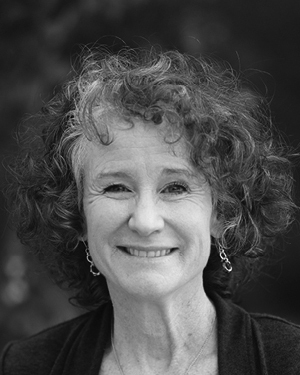Tiffany Shubert, MS ’97, PhD, PT : Inspiration and innovation
2022 Alumna of the Year, UCSF Department of Physical Therapy and Rehabilitation Science
 Entering physical therapy – the field that would become her passion and life’s work – was never Tiffany Shubert’s dream. It wasn’t even a thought.
Entering physical therapy – the field that would become her passion and life’s work – was never Tiffany Shubert’s dream. It wasn’t even a thought.
In the early 1990s, she’d graduated from UC San Diego as a communications major and was struggling to find direction when her mother, for reasons Shubert can’t explain, said, “Why don’t you try physical therapy?”
“I didn’t even really know what physical therapy was,” Shubert says. “I ended up volunteering at a local hospital in a neuro unit. I was hooked after the first day.”
There, she discovered opportunities to truly help people, which she found incredibly fulfilling – and helping people remains a driving force today.
Three decades later, her dedication and contributions to the field have led to Shubert being named 2022 Alumna of the Year for the UCSF/San Francisco State University (SFSU) Department of Physical Therapy and Rehabilitation.
Shubert says she was caught completely off guard by the news. “I was really happy, really excited,” she says. “It felt like coming full circle.”
In Motion
Shubert grew up in Thousand Oaks, Calif. Both of her parents had health care connections; her mother, Brenda, was a nurse and later dean of Moorpark Community College, while her father, Don, was a health system administrator and consultant.
Her mother’s serendipitous suggestion to pursue physical therapy led Shubert to UCSF, and she calls her time in the UCSF/SFSU joint master’s degree program “phenomenal.”
“We were still in the Laguna Honda Building. It was definitely a little old-school,” Shubert says. “I really liked the community, even from the first day. The professors were always there to help, to facilitate, to challenge.”
She appreciated the range of ages and life experiences in her cohort, and the model of taking courses alongside practitioners from other disciplines. “To provide good health care, you have to work as a team, and you have to respect everybody on that team and what they bring to the patient,” she says. “If you’re getting trained with other specialties, it levels the playing field.”
Among her key mentors was Kimberly Topp, PhD, PT, postdoc alum, professor and chair emerita of the UCSF Department of Physical Therapy and Rehabilitation Science. Topp says that as a student, Shubert was “a motivated, deep thinker who would ask probing questions in a way that made me, as a faculty member, reflect on what I was teaching. I always felt that Tiffany might be a step ahead of me.”
Another bonus of her time in San Francisco: Shubert met her husband, Brian Soher, PhD, who is now an associate professor of radiology at Duke University Medical School, not far from their home in Chapel Hill, N.C. They have a 16-year-old daughter, Emlyn, and 14-year-old son, Patrick. All have been incredibly supportive of Shubert and her work, she says.
Living Well at Every Age
Shortly after beginning her PhD program at the University of North Carolina at Chapel Hill, where she later worked as a research scientist, Shubert heard that a therapist was needed in the geriatric evaluation clinic – and that the university would fund her education if she took on the role.
A practical choice quickly became a whole lot more.
“I fell in love with the patient population. They instantly became my favorite,” she says. “You start meeting these people who have experienced the history that you’ve only read about. I treated one man who had danced with Martha Graham. Another patient was one of the first American troops to liberate a concentration camp during World War II.”
Inspiration led to innovation – Shubert soon found there was plenty of room for improvement in geriatric physical therapy, with a motivating principle: Help people age the way they want to.
“The first question I ask older patients is, ‘What’s really important to you?’ I start a conversation,” she says. “It might be as simple as you want to make your own cup of coffee and not be exhausted by that simple task. It may take a while, but we can get you there. People may not realize it, but you can get stronger in older age – even if you’re 85, even if you’re 95, even if you’re 100.”
Helping older adults live well has increasingly drawn Shubert into collaborations with technology companies. She’s created tools inspired by Nintendo’s Wii gaming console and Microsoft’s Kinect motion sensor that deliver virtual exercise programs to seniors. Currently, she’s working on how podcasts can facilitate clinicians’ access to the newest innovations in the field.
At every opportunity for such partnerships, she considers how the patients she serves can live healthy, active, self-sufficient lives for as long as possible.
“I think medicine has been very focused on how we keep people alive but not so much on how we create opportunities for meaningful lives,” Shubert says. “My big hope is that we facilitate older adults’ engagement with their own lives, on their own terms.”